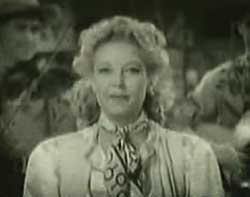 Western swing gal Cindy Walker stars in the jukebox soundie Election Day (1942) which has her rushing onto an elaborate set of a street in an old western town, where a couple voting signs are visible. She's accompanied by the Red River Boys who have a doublebass, fiddle, guitar & accordion.
Western swing gal Cindy Walker stars in the jukebox soundie Election Day (1942) which has her rushing onto an elaborate set of a street in an old western town, where a couple voting signs are visible. She's accompanied by the Red River Boys who have a doublebass, fiddle, guitar & accordion.
The title song sounds like more of a patriotic jingle than a western swing song & I really disliked it, despite the vigor with which she tries to sell the number:
"There'll be grandmas & grampas/ And inlaws & outlaws/ And kids of four generations/ There'll be cheerin' & hootin'/ And some friendly shootin'/Just to keep the spirit of this big occasion."
Guitarist Red River Dave joins the song at the end, scarcely improving it. There are fiddle & guitar solos more appealing than the song. Cindy tosses her hands about & kicks her legs, but whoever told her she could dance was being cruel.
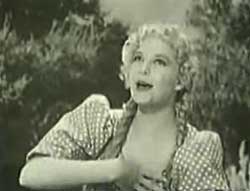 The wild if not quite nutty soundie Bearcat Mountain Gal (1942) stands out as an oddity. It opens with some hillbilly maidens playing teeter-totter on a board over a pickle barrel in the woods. The wild if not quite nutty soundie Bearcat Mountain Gal (1942) stands out as an oddity. It opens with some hillbilly maidens playing teeter-totter on a board over a pickle barrel in the woods.
Cindy Walker in her hillbilly babe outfit is churning butter with a symbolic motion you gotta see to believe, singing an absolutely awful song:
"There's a feller in the valley/ He's just as sweet as pie/ And I'm telling you this feller/ He's the apple of my eye."
Long-whiskered hillbillies with jugs of moonshine are trying to make time with the teeter-tottering gals, as Cindy keeps singing about pursuing that feller with bearcat mountain gal aggression.
Soon she has cornered the feller, knocked him flat on his ass, danced around him, then grabbed him up for a forced marriage. In the end he's collared & tethered & forced to churn the butter.
It's not much of a joke & it's certainly not a song worth singing, but it is amusingly costumed & over the top for a three-minute soundie.
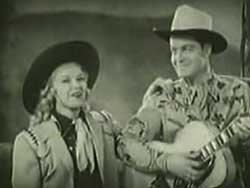 Ti-Yi-Yippee-Aye (1944) features Cindy Walker, again supported by the Red River Boys & Girls. They are usually just called the Red River Boys, but there are a couple extra gals standing around doing nothing until near the end when one of them hops about in a ridiculous hillbilly dance.
Ti-Yi-Yippee-Aye (1944) features Cindy Walker, again supported by the Red River Boys & Girls. They are usually just called the Red River Boys, but there are a couple extra gals standing around doing nothing until near the end when one of them hops about in a ridiculous hillbilly dance.
Cindy sings to Red River Dave: "Cowboy Bill's no Sinatra/ And his voice is nothing like Bing/ But the gals all put out in Texas/ When he puts his head back & sings/ Ti-yi, Yippee-aye/ That's the song I sing as I swing along on my pony/ Yahoo! Yi-yi. Yippee-aye/ Got the world on a string & a gal I'll bring from San Antony."
This song sucks lemons & Cindy's personableness just can't save it. The ridiculous dance near the end, to a fiddle solo, makes it lively at least.
Cindy Walker really did have talent as she was a decent songwriter & interesting performer, but the soundies she made were novelty songs that didn't do her justice, indeed, were rather an insult to her actual talents.
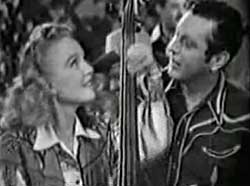 Deuce Spriggins & His Orchestra star in the western swing soundie Missouri (1941). Deuce stands out front of the orchestra with Carolina Cotton stage right on double-bass. Hank Penny suddenly stands up in the orchestra pit holding but not playing his guitar, singing:
Deuce Spriggins & His Orchestra star in the western swing soundie Missouri (1941). Deuce stands out front of the orchestra with Carolina Cotton stage right on double-bass. Hank Penny suddenly stands up in the orchestra pit holding but not playing his guitar, singing:
"I often wish that I could see my old home town once more/ The old red school I went to with that little girl next door/ I see that stopper bobbin' when that catfish starts to bite/ I see a blue sky framin' little clouds of snowy white/ Missouri, I'm hearing you calling me/ Missouri, you never let me be/ Missouri, I know I can't be free/ My heart is going to yearn till I return/ Missouri's calling me."
The tune's frankly kind of miserable but it has plenty of nostalgia for the rustic life that most of these performers couldn't wait to leave behind it sucked so bad.
Western swing solos for steel guitar & for accordian (by Billy Leibert) & a fiddlin' trio sweeten up a so-so film. After the musical bridge, Deuce Spriggins sings the rest of the song, & three guitar strummers stand up to harmonize with him. When all is finished, it has come off as inferior to the Sons of the Pioneers, but okay.
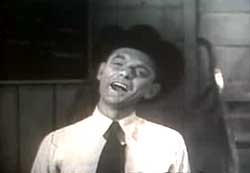 Bob Wills & His Texas Playboys star in the short-short Ida Red (1951). This is a Snader telescription complete in itself, & distinct from the separately circulated clip of the same song taken from the movie Go West Young Lady (1941) in which the lead vocal is by Tommy Duncan.
Bob Wills & His Texas Playboys star in the short-short Ida Red (1951). This is a Snader telescription complete in itself, & distinct from the separately circulated clip of the same song taken from the movie Go West Young Lady (1941) in which the lead vocal is by Tommy Duncan.
For the Snader performance, Bob starts it off with a great solo on fiddle. There's also a steel guitar solo by Bobby Koefer, Cotton Whittington with a brief guitar solo, & a Skeeter Elkin piano instrumental break worthy of boogie woogie right in the middle of a country western performance.
The lead vocal is handled by baby-faced Joe Andrews: "Light's in the parlor, fire's in the grate/ Clock on the mantle says it's a gettin' late/ Curtains on the window, snowy white/ The parlor's pleasant on Sunday night."
Also seen in this telescription are Joe Holley on second fiddle & Ocie Stockard barely glimpsed on banjo.
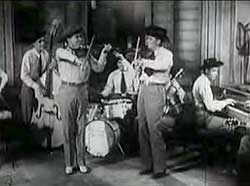 The Texas Playboys were a western swing but Ida Red has a streak of authentic hillbilly. The Texas Playboys were a western swing but Ida Red has a streak of authentic hillbilly.
Bob Wills' band stood at a level of greatness that makes it understandable why such musical sophisti-cats might be just a little annoyed by the faux hillbilly acts groups like the Korn Kobblers who knew nothing about a culture they lampooned.
Sittin' On Top of the World (1951) has Wills & the Texas Playboys putting the western swing spin on a blues classic. Bob & Joe on fiddles are kind of grating on this one. Whittington's guitar is much better, & Bobby Koeffer's steel guitar solo however is excellent.
So it's an uneven performance. And Bob Will's vocal is only so-so because he's just not a blues singer at heart -- or at soul.
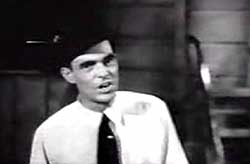 Another telescript film Blue Prelude (1951) begins with Bob Wills greeting the viewer then going straight to a Bobby Koeffer steel guitar solo, haunting & slow. Another telescript film Blue Prelude (1951) begins with Bob Wills greeting the viewer then going straight to a Bobby Koeffer steel guitar solo, haunting & slow.
Joe Ferguson begins singing: "Let me sigh, let me cry when I'm blue/ Let me go way from this lonely town/ It won't be long till by song will be through/ Cuz I know I'm on my last go-round."
Joe really captures a blend of blues & western swing & is simply splendid. Bob vamps around the stage getting in the way of the mood, but hey, he's got to remind everyone he's the star of the band, & he says "So long" at the end to make up for not giving himself a violin solo. Heck, I'm just being picky, this is a good number well done.
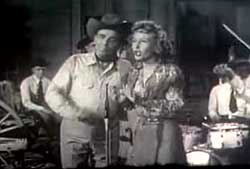 Three Miles South of Cash in Arkansas (1951) incorporates a steel guitar solo for Bobby Koefer & fiddle for Joe Holley. Three Miles South of Cash in Arkansas (1951) incorporates a steel guitar solo for Bobby Koefer & fiddle for Joe Holley.
Bob Wills dances about with Carolina Cotton for a couple seconds & then they burst into a duet of the title song. It's hillbilly swing in the best sense.
Bob & Carolina are vamping to amuse within the comedy number, almost losing it at one point busting into laughter when it's too obvious Carolina is relying on cue cards for the lyrics, & has lost her place. Snaders were legit live performances.
Carolina was famed for her yodelling & Bob joins in, but the yodeling doesn't go far & seems tossed in from expectation. In sum it rates high in the cute department & is catchy enough to be a good if silly song.
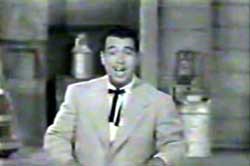 Tennessee Ernie Ford sings Kissing Bug Boogie (1951) in this Snader telescription, backed up by Jimmy Bryant on electric guitar & Speedy West on steel guitar, both of whom are more interesting in this number than Ernie.
Tennessee Ernie Ford sings Kissing Bug Boogie (1951) in this Snader telescription, backed up by Jimmy Bryant on electric guitar & Speedy West on steel guitar, both of whom are more interesting in this number than Ernie.
Ernie was one of the early cross-over artists, a folksy country singer trying to be a boogie woogie jazz singer, & managing to sell records on both sides of the fence.
This is a fairly workmanlike boogie woogie number that starts off with Billy Liebert's ultra-standard boogie piano. Ernie really doesn't upgrade the familiar boogie woogie tune-with-different-words with his shaky stylization:
"It all began down at Benny's on a Saturday night/ When something blew out the fuses, left the room without light..." If it were the only thing you ever heard Ernie sing you'd swear he couldn't sing at all.
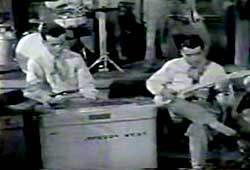 But the instrumental livens up when Jimmy Bryant gets a solo on his telecaster electric guitar, & the camera slips over to Speedy West for far too little of his steel guitar. But the instrumental livens up when Jimmy Bryant gets a solo on his telecaster electric guitar, & the camera slips over to Speedy West for far too little of his steel guitar.
A redundant Snader telescription has Ernie performing with the same guys on Shot Gun Boogie (1951) which is pretty much the same song with different lyrics, but funnier lyrics & Ernie was as much humorist as he was singer so this one makes a better soundie:
There it stands in the corner with the barrel so straight/ I looked out the winder a&nd over the gate/ The big fat rabbits are jumpin' in the grass/ Wait 'till they hear my old shotgun blast."
It's about being a hick hunter & smoothly mixes the then-modern boogie sound with Ernie's country western image. Jimmy & Speedy get a moment to shine as well.
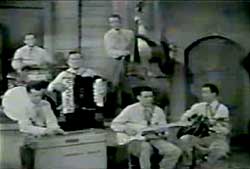 At least it isn't a third boogie woogie variation when Ernie sings She's My Baby (1951) standing between some potted shrubs on the stage. At least it isn't a third boogie woogie variation when Ernie sings She's My Baby (1951) standing between some potted shrubs on the stage.
It's not the familiar "Yes Sir, She's My Baby," which might've been fun, but a totally crummy original number for Ernie:
"There's someone I know who is lovely/ And as sure as the stars shine above me/ She is mine only mine/ And she's nothing but fine/ And I'd like you to know she's my baby."
It seems to have been written to the tune of an old children's song that begins "She sat on a hillside and played her guitar, played her guitar, played her guitar/ She sat on a hillside & played her guitar, played her gi-tar-har-har-har," except that's a better song.
To show what a pea-pickin' down home sweety-pie he is, during the instruental break Ernie whittles. He's a cute fellow & when I was a child I kind of liked him, & his great hit "Sixteen Tons" still resonates. But by & large he merits bigger kudos as a comedian & character actor than as a singer.
copyright © by Paghat the Ratgirl
|
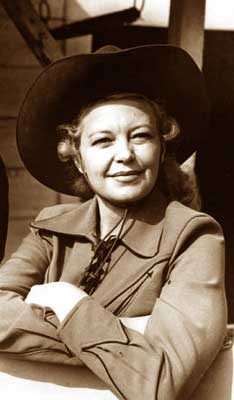





 The Texas Playboys were a western swing but Ida Red has a streak of authentic hillbilly.
The Texas Playboys were a western swing but Ida Red has a streak of authentic hillbilly.
 Three Miles South of Cash in Arkansas (1951) incorporates a steel guitar solo for Bobby Koefer & fiddle for Joe Holley.
Three Miles South of Cash in Arkansas (1951) incorporates a steel guitar solo for Bobby Koefer & fiddle for Joe Holley.
 But the instrumental livens up when Jimmy Bryant gets a solo on his telecaster electric guitar, & the camera slips over to Speedy West for far too little of his steel guitar.
But the instrumental livens up when Jimmy Bryant gets a solo on his telecaster electric guitar, & the camera slips over to Speedy West for far too little of his steel guitar. At least it isn't a third boogie woogie variation when Ernie sings She's My Baby (1951) standing between some potted shrubs on the stage.
At least it isn't a third boogie woogie variation when Ernie sings She's My Baby (1951) standing between some potted shrubs on the stage.